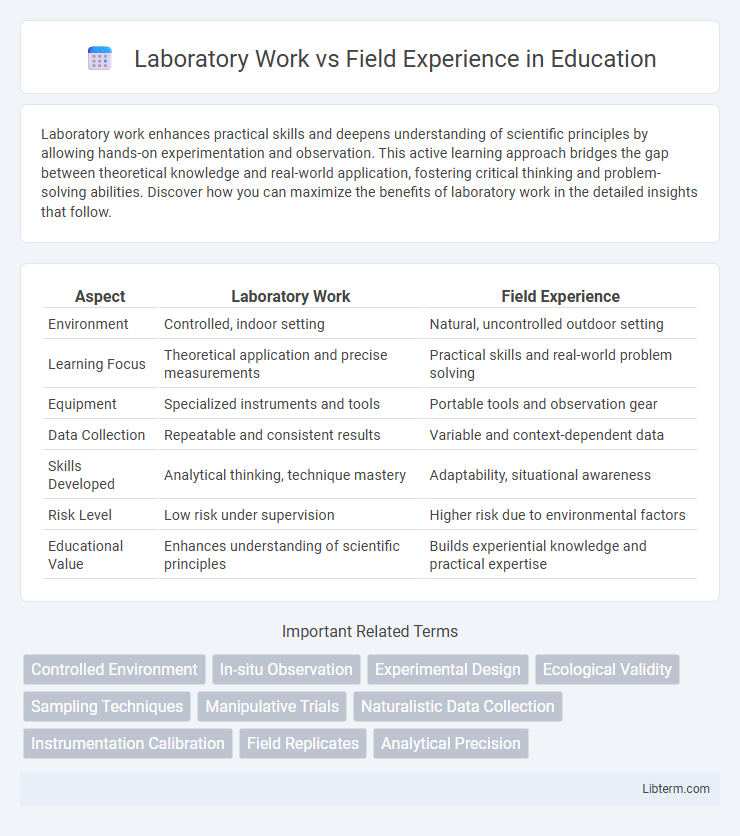Laboratory work enhances practical skills and deepens understanding of scientific principles by allowing hands-on experimentation and observation. This active learning approach bridges the gap between theoretical knowledge and real-world application, fostering critical thinking and problem-solving abilities. Discover how you can maximize the benefits of laboratory work in the detailed insights that follow.
Table of Comparison
| Aspect | Laboratory Work | Field Experience |
|---|---|---|
| Environment | Controlled, indoor setting | Natural, uncontrolled outdoor setting |
| Learning Focus | Theoretical application and precise measurements | Practical skills and real-world problem solving |
| Equipment | Specialized instruments and tools | Portable tools and observation gear |
| Data Collection | Repeatable and consistent results | Variable and context-dependent data |
| Skills Developed | Analytical thinking, technique mastery | Adaptability, situational awareness |
| Risk Level | Low risk under supervision | Higher risk due to environmental factors |
| Educational Value | Enhances understanding of scientific principles | Builds experiential knowledge and practical expertise |
Introduction to Laboratory Work and Field Experience
Introduction to Laboratory Work emphasizes controlled environments to conduct experiments, analyze data, and develop technical skills essential for scientific inquiry. Field Experience offers hands-on learning through direct observation and data collection in natural settings, enhancing practical understanding and application of theoretical concepts. Both approaches provide complementary skills crucial for comprehensive scientific education and research proficiency.
Defining Laboratory Work: Scope and Methods
Laboratory work encompasses controlled experiments and precise measurements conducted in specialized settings to investigate scientific hypotheses, ensuring reproducibility and accuracy. It employs standardized equipment, methodologies such as titration, chromatography, and microscopy, and rigorous data analysis to isolate variables and determine causal relationships. The scope of laboratory work extends across disciplines including chemistry, biology, and physics, facilitating foundational research and material testing under regulated conditions.
Exploring Field Experience: Key Characteristics
Field experience emphasizes hands-on learning in real-world environments, fostering practical skills and direct observation that cannot be replicated in laboratory settings. It often involves adapting to unpredictable conditions and engaging with complex, dynamic ecosystems, providing invaluable context to theoretical knowledge. This immersive approach enhances problem-solving abilities and deepens understanding of subject matter through active participation and environmental interaction.
Skills Developed in Laboratory Environments
Laboratory environments cultivate critical analytical skills through controlled experimentation and precise data collection, fostering attention to detail and methodological rigor. Hands-on use of specialized instruments enhances technical proficiency, while systematic problem-solving promotes scientific reasoning and hypothesis testing. These skills form a foundational basis that supports accurate research outcomes and prepares individuals for advanced scientific inquiry.
Practical Insights Gained from Field Experience
Field experience provides hands-on learning opportunities that enhance problem-solving skills and real-world application of theoretical knowledge. Unlike controlled laboratory environments, fieldwork exposes individuals to variable conditions, fostering adaptability and critical observation. Practical insights gained through direct interaction with environmental factors and operational challenges improve decision-making and technical competence in professional settings.
Comparing Research Approaches: Lab vs. Field
Laboratory work offers controlled conditions that allow precise manipulation of variables, facilitating reproducible experiments and detailed data collection. Field experience provides ecological validity by observing phenomena in natural environments, capturing complex interactions often absent in lab settings. Combining both approaches enhances research robustness by integrating experimental control with real-world applicability.
Equipment and Technology: Laboratory vs. Field Applications
Laboratory work utilizes advanced, precise equipment such as spectrometers, microscopes, and automated analyzers designed for controlled environments, ensuring high accuracy and reproducibility in experiments. Field experience relies on portable, rugged technology like GPS devices, soil sensors, and handheld data loggers that capture real-time information in variable and often unpredictable conditions. Differences in equipment and technology between laboratory and field settings directly impact data quality, operational efficiency, and the scope of scientific investigation.
Challenges and Limitations of Each Method
Laboratory work offers controlled environments ideal for precise data collection but often faces challenges such as limited ecological validity and artificial settings that may not reflect real-world conditions. Field experience provides authentic context and natural interactions, yet it encounters limitations including unpredictable variables, logistical difficulties, and potential safety risks. Balancing these methods requires addressing their respective constraints to ensure comprehensive and reliable research outcomes.
Integrating Laboratory Work with Field Experience
Integrating laboratory work with field experience enhances scientific understanding by combining controlled experiments with real-world observations, allowing researchers to validate hypotheses in diverse environments. This approach improves data accuracy and reliability through triangulation, while developing practical skills essential for environmental analysis, ecology, and geology. Seamless integration fosters a comprehensive learning process, bridging theoretical knowledge and applied research for robust scientific outcomes.
Conclusion: Balancing Laboratory and Field Learning
Balancing laboratory work and field experience cultivates comprehensive scientific expertise by integrating controlled experimentation with real-world observation. Laboratory settings enhance precision and replicability, while field experience offers context-specific insights and adaptability to variable conditions. Optimal learning outcomes arise from synergizing both environments, fostering a well-rounded skill set essential for robust research and practical application.
Laboratory Work Infographic

 libterm.com
libterm.com